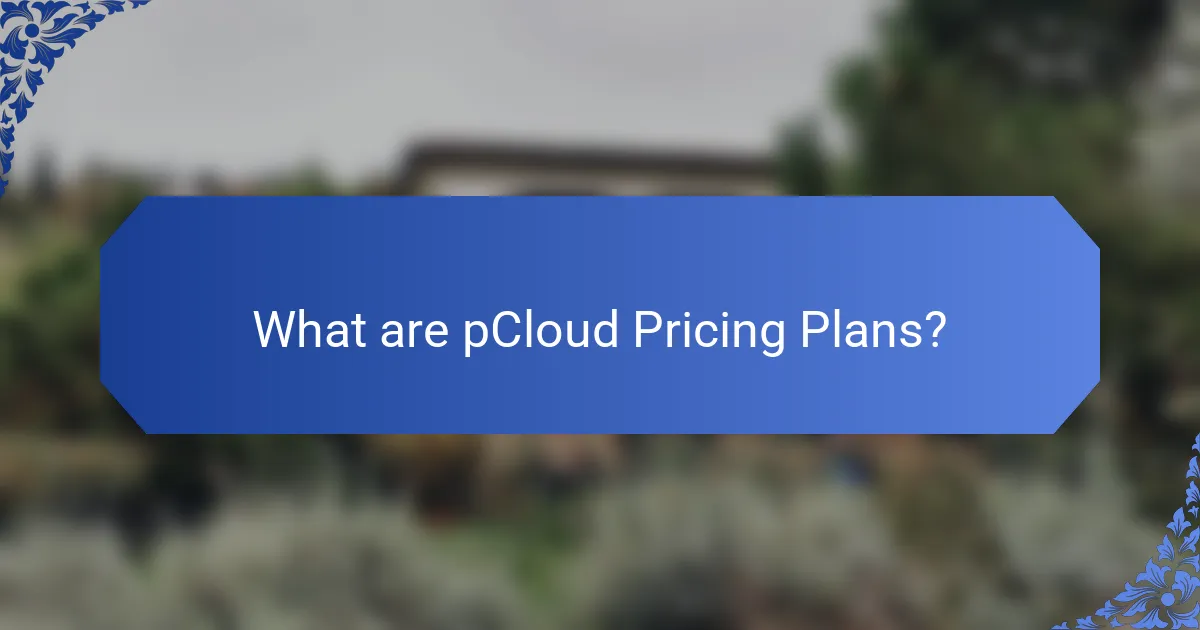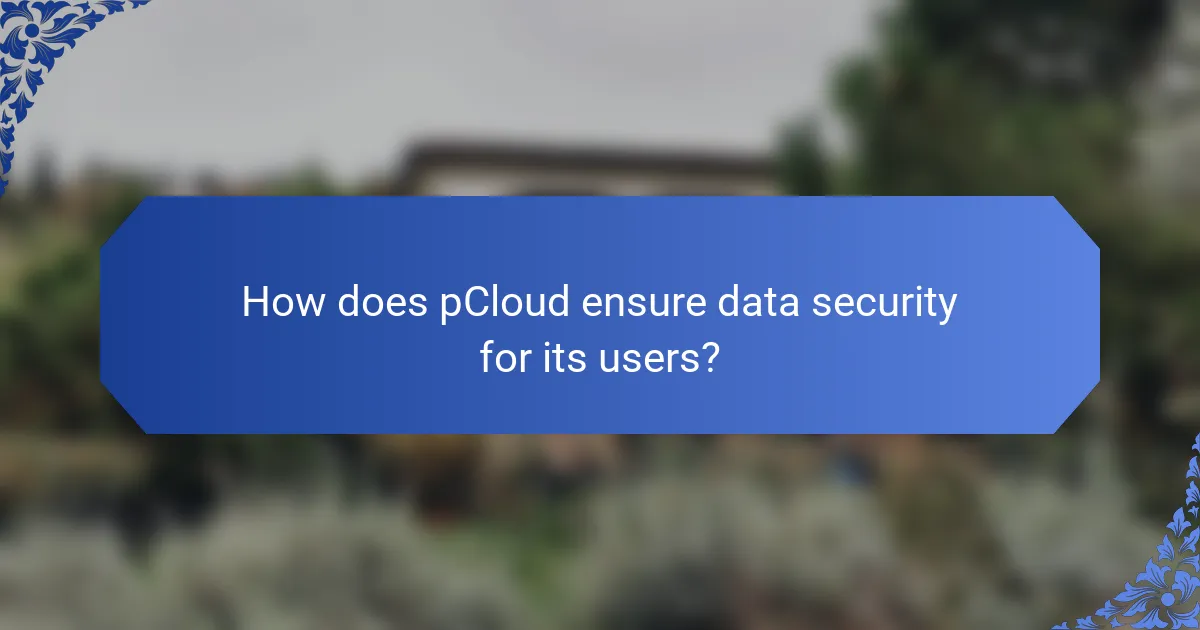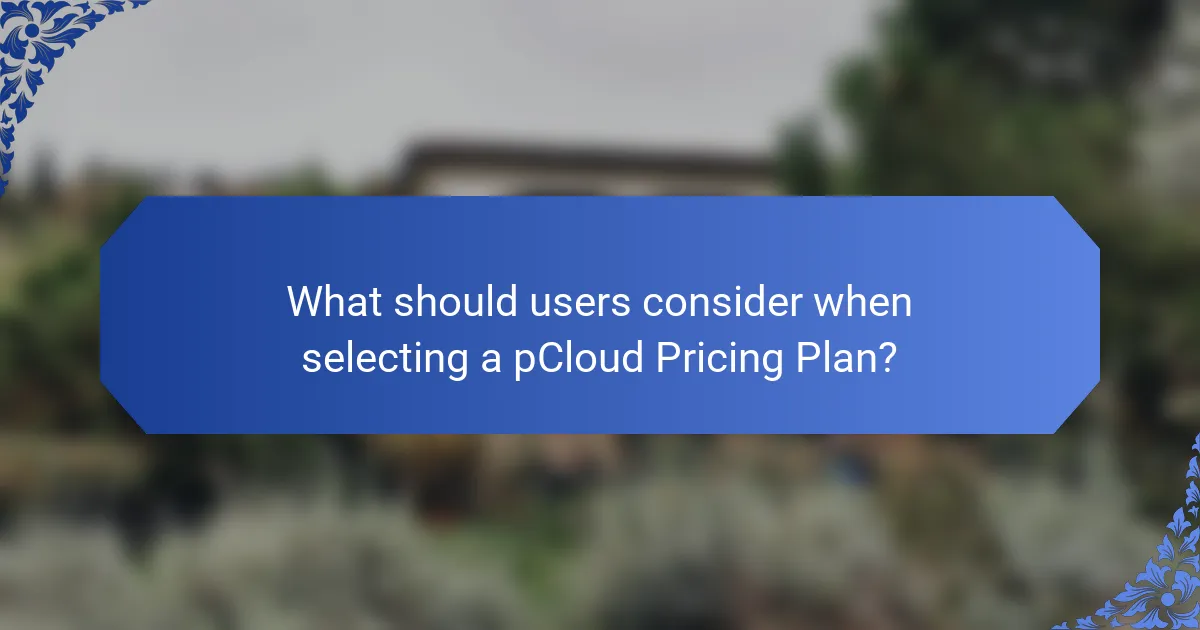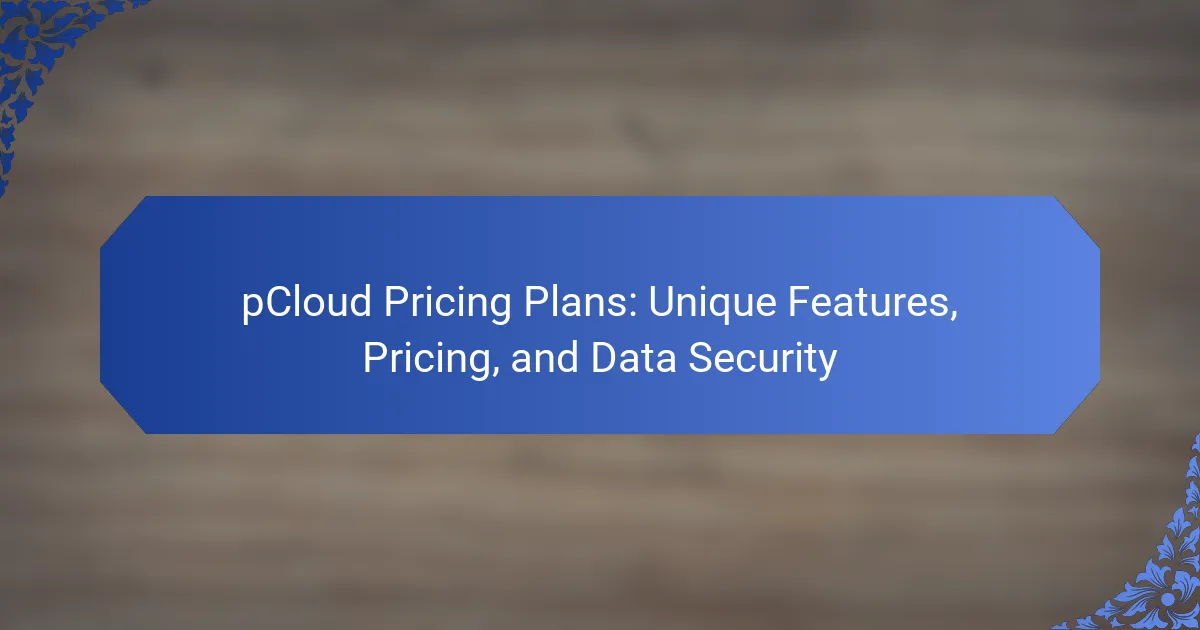pCloud is a cloud storage service that provides various pricing plans tailored to different user needs. It offers a free tier with 10 GB of storage, along with premium options that include a monthly Premium plan for 500 GB at $4.99 and a Premium Plus plan for 2 TB at $9.99. Additionally, users can opt for lifetime plans, with costs of $175 for 500 GB and $350 for 2 TB. pCloud prioritizes data security through robust encryption methods, including client-side and optional zero-knowledge encryption with pCloud Crypto. Users should evaluate their storage requirements, subscription duration, and desired features when selecting a plan, ensuring affordability and device access compatibility.

What are pCloud Pricing Plans?
pCloud offers several pricing plans for its cloud storage services. The plans include a free tier with 10 GB of storage. Additionally, there are premium plans for individuals. The Premium plan costs $4.99 per month for 500 GB. The Premium Plus plan is available for $9.99 per month for 2 TB of storage. There are also lifetime plans. The Premium lifetime plan costs a one-time fee of $175 for 500 GB. The Premium Plus lifetime plan costs $350 for 2 TB. These plans provide various features, including file sharing and data security.
How do pCloud Pricing Plans compare to other cloud storage options?
pCloud pricing plans are competitive when compared to other cloud storage options. They offer a range of plans including free, premium, and lifetime options. The free plan provides 10 GB of storage, which is higher than many competitors. Premium plans start at $4.99 per month for 500 GB. This pricing is lower than many leading services like Dropbox and Google Drive. pCloud also offers a unique lifetime plan for a one-time payment, which is not commonly available. Additionally, pCloud includes features like client-side encryption at no extra cost, enhancing data security. This combination of pricing and features makes pCloud an attractive option in the cloud storage market.
What are the key differences between pCloud and its competitors?
pCloud offers unique features that distinguish it from competitors like Dropbox and Google Drive. One key difference is its lifetime subscription option, which allows users to pay a one-time fee for permanent storage. Competitors typically operate on a subscription basis, requiring ongoing payments. pCloud also provides a built-in file versioning feature for up to 30 days, which is not universally available with all competitors. Additionally, pCloud offers client-side encryption, ensuring that files are encrypted before they leave the user’s device, enhancing security beyond what many competitors provide. Lastly, pCloud’s user interface is designed for simplicity, making it easier for users to navigate compared to some competitors with more complex layouts.
How do user needs influence the choice of pCloud over other services?
User needs significantly influence the choice of pCloud over other services. pCloud offers a user-friendly interface that appeals to individuals seeking simplicity. It provides extensive storage options, catering to users with high data storage requirements. Security features, such as client-side encryption, attract privacy-conscious users. Additionally, flexibility in pricing plans meets diverse budgetary needs. The ability to access files from multiple devices adds to its appeal for users on the go. According to user reviews, pCloud’s synchronization speed is a critical factor for those prioritizing efficiency. These features collectively make pCloud a preferred choice among various cloud storage services.
What unique features do pCloud Pricing Plans offer?
pCloud Pricing Plans offer unique features such as lifetime subscription options and a built-in media player. Users can choose between monthly, yearly, or one-time payment plans for lifetime access. Each plan includes secure file storage with client-side encryption. Additionally, pCloud provides a file versioning feature that allows users to recover previous versions of files. The plans also include a file sharing feature with customizable access rights. Users benefit from cross-platform compatibility, allowing access from various devices. The unique features enhance user experience and data security significantly.
How does pCloud’s lifetime plan work?
pCloud’s lifetime plan provides users with permanent access to cloud storage for a one-time fee. Users pay a single upfront cost to secure storage space without recurring monthly or yearly payments. The plan typically includes a specific amount of storage, such as 500 GB or 2 TB. Once purchased, users retain access to their storage indefinitely. The plan also includes features like file sharing, synchronization, and data security measures. Users benefit from automatic updates and access to new features without additional costs. This model is appealing for those seeking long-term cloud storage solutions.
What are the advantages of pCloud’s subscription options?
pCloud’s subscription options offer several advantages. They provide flexible pricing plans tailored to different user needs. Users can choose between monthly and yearly subscriptions, allowing budget flexibility. pCloud also offers a lifetime subscription option, which ensures long-term access without recurring fees. Each subscription includes features like 500 GB to 10 TB of storage, depending on the plan. Additionally, pCloud provides enhanced security features, including client-side encryption. Users benefit from easy file sharing and collaboration tools. The service is compatible with multiple devices, enhancing accessibility. Overall, pCloud’s subscription options cater to diverse storage and security requirements.
What are the different tiers of pCloud Pricing Plans?
pCloud offers three main pricing tiers: Free, Premium, and Premium Plus. The Free plan provides 10 GB of storage at no cost. The Premium plan offers 500 GB of storage for an annual fee. The Premium Plus plan includes 2 TB of storage, also for an annual fee. Each plan has unique features such as file versioning and enhanced security options. The Premium and Premium Plus plans also allow for additional features like extended file history and client-side encryption.
What does the free tier include and what are its limitations?
The free tier of pCloud includes 10 GB of storage. Users can earn additional storage through referrals and other activities. The limitations of the free tier include a lack of file versioning and limited access to advanced features. Users cannot access features like pCloud Crypto, which offers enhanced security. Additionally, the free tier has restrictions on file sharing and download links. The storage space cannot be upgraded without transitioning to a paid plan. These limitations affect the overall functionality and flexibility for users who require more robust features.
What features are available in the premium and family plans?
The premium plan offers 500 GB of storage and a file versioning feature. It includes the ability to share files with password protection and expiration dates. Users also benefit from a premium support service. The family plan provides the same features as the premium plan but allows up to five users. Each user in the family plan receives their own 500 GB of storage. Both plans support automatic backups and file synchronization across devices. These features enhance user experience by ensuring data security and accessibility.

How does pCloud ensure data security for its users?
pCloud ensures data security for its users through robust encryption and secure data storage practices. The service employs client-side encryption, meaning that files are encrypted on the user’s device before being uploaded. This ensures that only the user has access to the encryption keys. pCloud also offers an optional pCloud Crypto feature for additional security, which provides zero-knowledge encryption. Data is stored in secure data centers with advanced security measures, including firewalls and intrusion detection systems. Regular security audits and compliance with international data protection regulations further enhance user data safety.
What security features are included in pCloud Pricing Plans?
pCloud Pricing Plans include several robust security features. These features ensure the protection of user data. One key feature is end-to-end encryption, which secures files during transfer and storage. Another feature is file versioning, allowing users to restore previous versions of files. pCloud also offers two-factor authentication for an added layer of security. Users can enable this feature to protect their accounts from unauthorized access. Additionally, pCloud provides a secure data center with 256-bit AES encryption. This encryption standard is widely recognized for its security strength. Together, these features create a comprehensive security framework for pCloud users.
How does pCloud implement encryption for user data?
pCloud implements encryption for user data through a combination of client-side encryption and secure data transfer protocols. Client-side encryption ensures that files are encrypted before they leave the user’s device. This means that only the user holds the decryption keys, maintaining data privacy. pCloud uses AES 256-bit encryption, a widely recognized standard for data security. Additionally, data is transmitted over secure SSL/TLS connections to protect it during transfer. This dual-layer of encryption safeguards user information from unauthorized access.
What additional security measures does pCloud offer?
pCloud offers several additional security measures to protect user data. These include end-to-end encryption through pCloud Crypto, which ensures that files are encrypted before they leave the user’s device. Users have the option to enable two-factor authentication for added account security. pCloud also employs TLS/SSL encryption during data transfer to safeguard against interception. The service provides regular security audits to maintain compliance with industry standards. Additionally, pCloud stores data in secure data centers with 24/7 surveillance. These measures collectively enhance the overall security of user data on the platform.
Why is data security important when choosing a cloud storage provider?
Data security is crucial when choosing a cloud storage provider because it protects sensitive information from unauthorized access. Cloud storage often contains personal, financial, or business data that can be targeted by cybercriminals. A secure provider implements encryption protocols to safeguard data both at rest and in transit. According to a 2020 report by Cybersecurity Ventures, cybercrime is expected to cost the world $10.5 trillion annually by 2025. This statistic highlights the financial implications of inadequate data security. Additionally, compliance with regulations such as GDPR or HIPAA is necessary for businesses to avoid legal repercussions. A provider’s security measures directly influence its reliability and trustworthiness. Therefore, evaluating data security is essential for ensuring the safety of stored information.
How does data security impact user trust in cloud services?
Data security significantly impacts user trust in cloud services. Users are more likely to adopt cloud solutions when they feel their data is secure. High-profile data breaches have highlighted vulnerabilities in cloud storage. For instance, a 2020 study by IBM found that 80% of consumers would stop using a service after a data breach. Strong encryption practices and compliance with regulations enhance perceived security. Users prioritize services that demonstrate robust data protection measures. Trust is built through transparency about security protocols. Overall, effective data security fosters confidence in cloud service providers.
What are the potential risks of inadequate data security?
Inadequate data security can lead to significant risks. These risks include data breaches, which can expose sensitive information. Such breaches can result in financial losses for individuals and organizations. Identity theft is another consequence, where personal information is misused. Inadequate security can also lead to loss of customer trust. A study by IBM found that the average cost of a data breach in 2021 was $4.24 million. Regulatory penalties may arise from failing to protect data adequately. Additionally, businesses may face operational disruptions due to cyberattacks. Overall, the implications of inadequate data security can be severe and far-reaching.

What should users consider when selecting a pCloud Pricing Plan?
Users should consider their storage needs when selecting a pCloud Pricing Plan. pCloud offers different plans based on storage capacity, ranging from 10 GB to 2 TB. The duration of the subscription is also important. Users can choose between monthly, yearly, or lifetime plans. Additionally, users should evaluate the features included in each plan. Some plans offer enhanced security features like pCloud Crypto. Users should also consider the number of devices they plan to use with the service. pCloud allows access from multiple devices but may have limits on some plans. Lastly, users should review the pricing structure for affordability. Plans vary in cost, and users should choose one that fits their budget while meeting their needs.
How can users determine which pCloud plan is right for them?
Users can determine which pCloud plan is right for them by evaluating their storage needs and usage patterns. pCloud offers multiple plans, including free, premium, and family options. Users should consider how much data they need to store and share. The free plan provides limited storage, while premium plans offer more space and additional features. Users can also assess the benefits of features like file versioning and encryption. Comparing the costs of each plan against the features is essential. Users should review their budget and the specific functionalities they require. This thorough assessment will help them choose the most suitable pCloud plan for their needs.
What factors should influence the choice of a pricing plan?
The choice of a pricing plan should be influenced by several key factors. First, consider the storage needs of the user. Different plans offer varying amounts of storage, which can impact the overall cost. Next, evaluate the features included in each plan. Some plans may offer additional functionalities like file versioning or enhanced security.
User budget is another critical factor. Plans vary in price, so selecting one that fits within financial constraints is essential. Additionally, the duration of the commitment should be assessed. Some plans may offer better rates for annual subscriptions compared to monthly payments.
Lastly, the level of customer support provided can also influence the decision. Plans with robust support options may be more appealing to users needing assistance. These factors collectively guide users in selecting the most suitable pricing plan for their needs.
How can users assess their storage needs effectively?
Users can assess their storage needs effectively by evaluating their data usage patterns. Begin by identifying the types of files stored, such as documents, photos, and videos. Next, quantify the size of these files to understand total storage requirements. Users should also consider future data growth based on usage trends. Regularly reviewing storage consumption helps in making informed decisions. Tools like storage analyzers can provide insights into space usage. According to a study by Gartner, organizations that regularly assess their storage needs can reduce costs by up to 30%.
What are the best practices for maximizing the benefits of pCloud Pricing Plans?
To maximize the benefits of pCloud Pricing Plans, users should select the plan that aligns with their storage needs. Evaluating personal or business data requirements is crucial. Users can take advantage of the lifetime plan for long-term savings. Utilizing the referral program can provide additional free storage. Regularly backing up data ensures security and accessibility. Users should also leverage pCloud’s file sharing features for collaboration. Taking advantage of the pCloud app’s synchronization capabilities enhances productivity. Lastly, staying updated with pCloud’s promotions can lead to cost savings.
How can users optimize their storage usage on pCloud?
Users can optimize their storage usage on pCloud by utilizing selective sync and managing file versions. Selective sync allows users to choose which files and folders to sync with their devices. This feature prevents unnecessary files from taking up space on local storage. Additionally, pCloud offers file versioning, which lets users revert to previous versions of files without storing multiple copies. Users should also regularly review and delete unused files and folders to free up space. Utilizing the pCloud web interface can help users identify large files and duplicates. By organizing files into folders and using tags, users can improve navigation and access to important data. These strategies collectively enhance storage efficiency on pCloud.
What tips can help users enhance their data security on pCloud?
To enhance data security on pCloud, users should enable two-factor authentication. This adds an extra layer of security beyond just a password. Users should also use strong, unique passwords for their accounts. Password managers can help generate and store these passwords securely. Regularly updating passwords is advisable to minimize risks. Users should also be cautious about sharing files and only share with trusted individuals. Encrypting sensitive files before uploading adds another security measure. Finally, keeping the pCloud application updated ensures users benefit from the latest security features. These practices collectively strengthen data security on pCloud.
pCloud is a cloud storage service offering various pricing plans, including a free tier with 10 GB of storage, premium options starting at $4.99 per month for 500 GB, and unique lifetime plans for a one-time fee. The article explores the features and benefits of pCloud’s pricing plans, comparing them to competitors like Dropbox and Google Drive, highlighting advantages such as client-side encryption and file versioning. Additionally, it discusses user needs, data security measures, and best practices for optimizing storage and enhancing security, providing a comprehensive overview of how pCloud meets diverse storage requirements.
